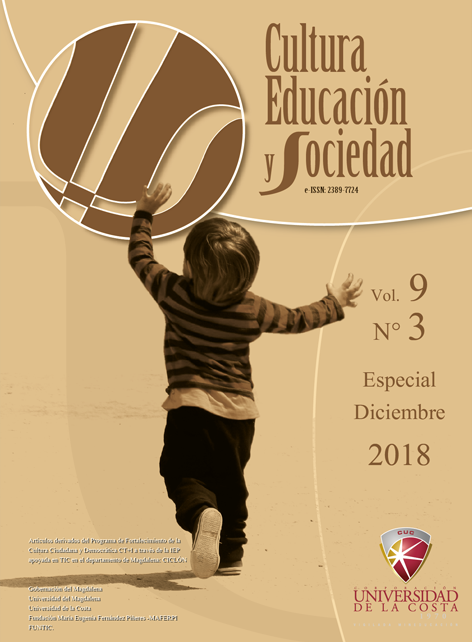Values practice supported by information and communication technologies as a strategy for healthy coexistence.
DOI:
https://doi.org/10.17981/cultedusoc.9.3.2018.73Keywords:
Information and Communication Technologies (ICT), pedagogical strategies, training in values, coexistenceAbstract
This article shows the results taking into account the emerging issues in the Departmental Educational Institution (IED) Santa Rosa de Lima at the disciplinary level, this research project arises, which supported by information and communication technologies (ICT) aims to Strengthen values in students as a strategy to improve coexistence in the institution. Promote the practice of values supported by information and communication technologies as a strategy for healthy coexistence. We worked under the qualitative methodology with participatory action research model. The population was conformed by students of primary of the Educational Institution Departmental (IED) Santa Rosa de Lima. To collect the data were used, surveys and direct observation. It was evidenced that aspects such as the perception of the environment and inappropriate behaviors carried out by the students, lead to the permanence of the bad coexistence in the institution.
Downloads
References
Báez y Pérez de Tudela, J. (2009). Investigación cualitativa. Madrid, España: ESIC Editorial.
Bolívar, A. y Balaguer, F. (2007). La Educación para la Ciudadanía: marco pedagógico y normativo. Recuperado de http://www.educacionenvalores.org/IMG/pdf/bolivar_y_balaguer.pdf
Cabero, J. (2012). El rol del profesor ante las nuevas tecnologías de la información y la comunicación. Agenda académica, 7(1), 41-57.
Cacurri, V. (2013). Revista Educación con TIC, nuevas formas de enseñar en la era digital. Buenos Aires
Chaux, E. (2012). Educación, convivencia y agresión escolar. Bogotá: Taurus.
De la Concepción, A. (2015). Concepciones sobre participación de niñas, niños y adolescentes: Su importancia en la construcción de la convivencia escolar. Cultura Educación y Sociedad, 6(2), 9-28. Recuperado de: https://revistascientificas.cuc.edu.co/culturaeducacionysociedad/article/download/840/pdf_105/
Demarchi Sánchez, G., Aguirre Londoño, M., Yela Lozano, N., & Viveros Chavarria, E. (2015). Sobre la dinámica familiar. Revisión documental. Cultura Educación y Sociedad, 6(2). Recuperado a partir de https://revistascientificas.cuc.edu.co/culturaeducacionysociedad/article/view/1049
Eyssautier De la Mora, M. (2006). Metodología de la investigación. México: Cengage Learning.
Fernández-Ballesteros, R. (2005). Introducción a la evaluación psicológica. Madrid Pirámide.
Hernández, R., Fernández, C., & Baptista, P. (2014). Metodología de la investigación. Mexico, D.F.: McGraw-Hill Education.
Herrera, A. y Herrera, A. (2016). Las TIC como herramientas pedagógicas. Aracelisherrera10.blogspot.com.co. Retrieved 9 March 2018, from http://aracelisherrera10.blogspot.com.co/
Mena, I. (2007). Acuerdos de convivencia escolar para que todos aprendan y se sientan bien tratados. Recuperado de http://ww2.educarchile.cl/UserFiles/P0032/File/apoyo_emocional/Docentes/3%20 acuerdos_conv_escolar.pdf
Martínez, M. (2004). Ciencia y arte en la metodología cualitativa. México D.F: Editorial Trillas.
Ministerio de Educación Nacional de Colombia. (2004). Disponible en: https://www.mineducacion.gov.co/1621/article-166897.html
Mockus, A. (2002). La educación para aprender a vivir juntos. Convivencia como armonización de ley,
moral y cultura. Perspectivas, vol. XXXII, No. 1.
Núñez, E. y Ravina, R. (2017). Análisis del nivel de competitividad empresarial en el panorama publicitario colombiano fundamentada en el éxito creativo y la responsabilidad ética y jurídica JURÍDICAS CUC, vol. 13, no. 1, pp. 9-28. DOI: http://dx.doi.org/10.17981/juridcuc.13.1.2017.1
Ochoa, M. L. (2011). Implementación de las TIC como estrategia didáctica para generar Un aprendizaje significativo de los procesos celulares, en los estudiantes de Grado Sexto de la Institución Educativa San Andrés, del Municipio de Girardota. Obtenido de http://www.bdigital.unal.edu.co/5936/1/43666105.2012.pdf
Pérez, G. (2002). Investigación cualitativa. Retos e interrogantes. II técnicas y análisis de datos. Madrid: la Muralla S.A.
Ruiz, J. (2012). Metodología de la investigación cualitativa. Bilbao: Universidad de Deusto.
Schutter, A. (1987). Metodo y proceso de la investigación participativa en la capacitación rural. Patzcuaro, Michoacan: CREFAL.
Downloads
Published
How to Cite
Issue
Section
License
Copyright (c) 2018 CULTURA EDUCACIÓN Y SOCIEDAD

This work is licensed under a Creative Commons Attribution-NonCommercial-NoDerivatives 4.0 International License.
![]()
Creative Commons 2020 CULTURA EDUCACIÓN Y SOCIEDAD
This article is under international license Creative Commons Reconocimiento-NoComercial-SinObrasDerivadas 4.0.
The published articles are the sole responsibility of their authors and do not necessarily reflect the opinions of the editorial committee.
CULTURA EDUCACIÓN Y SOCIEDAD respects the moral rights of its authors, who assign to the editorial committee the patrimonial rights of the published material. In turn, the authors inform that this work is unpublished and has not been previously published.
All articles are under a:
Licencia Creative Commons Atribución-NoComercial-SinDerivadas 4.0 Internacional.
![]()


 English
English
 Español (España)
Español (España)




_12.53_.27_p_. m_._3.png)





_12.57_.35_p_. m_._3.png)
_12.50_.37_p_. m_._3.png)



